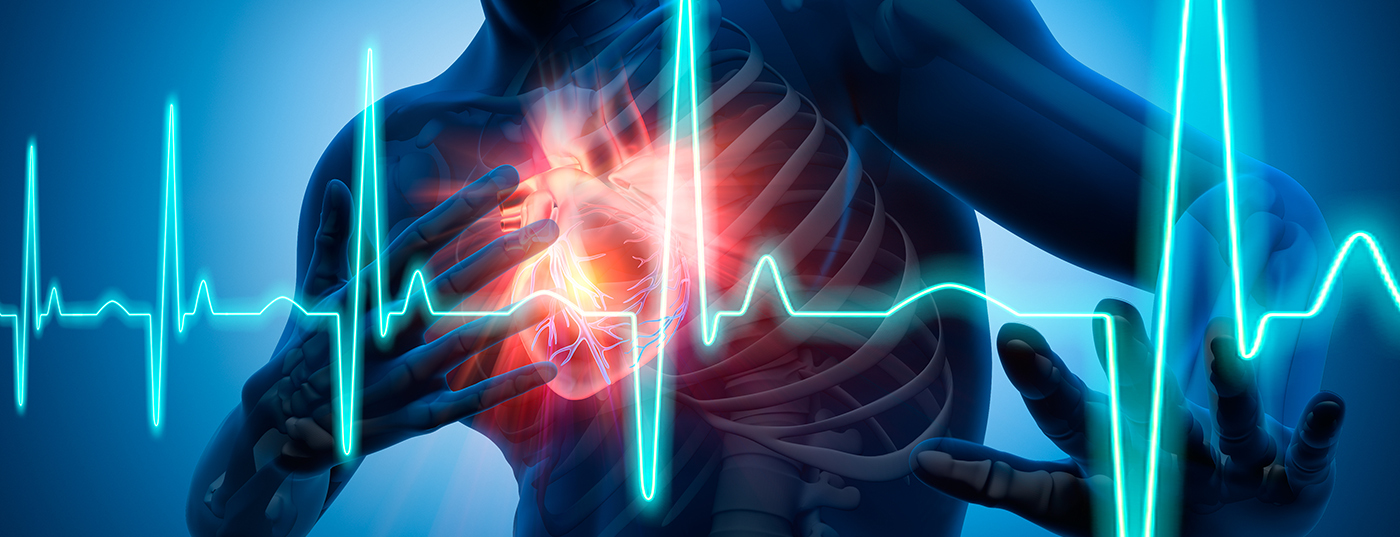With the current dramatic rise in SARS-CoV-2 infections and the associated emergency in hospitals and intensive care units, heart specialists fear that cardiac patients with acute heart conditions may once again avoid clinics and medical practices. This has already been particularly fatal in past pandemic waves: Especially in the lockdown, people shied away from making a life-saving emergency call or going to the emergency room when they suspected a heart attack or other emergency heart conditions – for fear of contracting SARS-CoV-2 or because of feared pandemic-related capacity bottlenecks for non-Corona-related cases in hospitals.
“The very high incidence rates for Covid-19 and hospitalization cases, which can vary widely by region, are likely to lead many people to conclude that emergency care for non-Covid-19 sufferers, such as patients with heart attacks, strokes, or other emergency complications, is no longer warranted. Fear of SARS-CoV-2 infection may also continue to be an issue for chronically ill patients despite vaccination. All this must not again lead to fatal delays in emergency patients,” warns cardiologist and intensive care specialist Prof. Thomas Voigtländer, MD, Chairman of the Board of the German Heart Foundation. Emergency care is basically (still) guaranteed, even if there is already a dramatic regional compression for emergency care due to high hospitalization incidences of more than 18 hospitalizations per 100,000 inhabitants, according to the Medical Director of the Agaplesion Hospital Frankfurt am Main. “However, this may change quickly in some places given the current emergency. It is now even more important that every individual does his or her part to push back the incidence of infection with the Covid-19 first vaccination and a booster shot, as well as by strictly adhering to the hygiene rules AHA+A+L.
Call emergency physician in case of heart attack and other life-threatening complications
Every minute you wait with symptoms of a heart attack without alerting emergency medical services and getting immediate medical care for the heart attack, you leave the optimal window of opportunity for heart attack treatment in the hospital. “This increases the risk of sudden cardiac death, and irreparable damage to the heart with permanent loss of performance becomes more likely,” Voigtländer said.
However, not only acute heart attacks, but also other life-threatening complications such as malignant cardiac arrhythmias or strokes are not cases of illness that can be postponed, but require emergency medical care by the emergency physician and the hospital. This also applies to circulatory disorders of the heart (ischemia) of higher urgency, such as main stem stenosis and unstable angina pectoris as precursors of myocardial infarction, as well as derailed (decompensated) heart failure, high-grade aortic valve stenosis and hypertensive emergencies. They continue to be subject to emergency care as a matter of course during the pandemic.
Know heart disease and its common warning signs
Everyone, and especially at-risk groups such as cardiovascular patients, should be aware of the major symptoms of heart attack and other cardiovascular diseases, some of which may overlap with symptoms of Covid-19 (shortness of breath, chest pain). In order to once again sensitize the population to seek medical care in clinics and practices in general in the event of a suspected heart attack as well as in the event of heart complaints, despite the Corona emergency, the German Heart Foundation and the German Society for Cardiology – Cardiovascular Research (DGK), together with the European Society of Cardiology (ESC) and the European Heart Network (EHN), launched the educational campaign “A sick heart can never wait – Despite Corona: Don’t ignore the heart’s warning signals” was launched. Information on heart attacks (causes, symptoms, treatment) and correct behavior in the event of a cardiac emergency, as well as on heart disease in general, can be found at www.herzstiftung.de/krankesherzwartetnie.
Our heart should always have the highest priority – even in these difficult times. Therefore, the joint appeal of the Heart Foundation, ESC, DGK and EHN to chronic heart patients and persons with first-time heart complaints: Listen to your heart, seek medical help in the clinic or practice. Continue to take your medications and keep your follow-up appointments.
Call emergency services immediately if you notice these signs of a heart attack
- Severe pain and a feeling of pressure in the chest: Signs of a heart attack may include pain that occurs predominantly in the chest or often exclusively behind the breastbone. They may radiate to other parts of the body such as the arms, upper abdomen, back, neck, jaw or shoulder blades. Chest pain or shortness of breath on the slightest exertion or at rest are particularly alarming. Behind this could be the so-called unstable angina pectoris (chest tightness), from which a heart attack can develop at any time. As a general rule, if the pain lasts longer than five minutes, you should act immediately.
- Massive feeling of tightness: Many people feel a violent pressure or a very strong feeling of constriction in the chest as a sign of a heart attack – as if “an elephant is standing on their chest.”
- Severe burning sensation: A severe burning sensation may occur in the chest.
- Anxiety sweat with cold, pale skin: People who suffer a heart attack often feel intense anxiety, which is also visible through pale facial skin and cold sweat.
- Nausea, vomiting, shortness of breath, pain in the upper abdomen: the signs of a heart attack can also be quite non-specific – especially in women. To be on the safe side and also not to overlook these symptoms, the recommendation is always to call an ambulance with an emergency doctor if the symptoms occur to an extent never experienced before.
Caution: Even though in many patients the heart attack comes suddenly and without precursors, according to recent data, symptoms also appear 24-48 h before the actual heart attack in about 50% of heart attack patients. Sufferers report brief episodes of chest tightness or burning behind the breastbone. This may occur at rest or with light exertion, and occasionally nighttime awakenings with this discomfort occur.
See a doctor immediately if you notice these warning signs of heart disease!
In general, affected individuals should see an internist or cardiologist immediately if the following warning signs are present. They can investigate whether, for example, a cardiac arrhythmia is present as a result of coronary artery disease (underlying disease of the heart attack), or other heart diseases such as valvular heart disease or cardiac insufficiency. If left untreated, these conditions can lead to serious, even emergency, complications:
- Pain or an uncomfortable tightness in the chest (angina pectoris) and/or shortness of breath
- Night awakening with pressure in the chest
- Tachycardia with limitation of resilience
- Stubborn heart stumble
- Brief loss of consciousness (syncope)
- Dizzy spells, imminent loss of consciousness
These complaints can also be warning signs of several heart diseases at the same time. Angina pectoris symptoms can be a harbinger of advanced coronary artery stenosis and even myocardial infarction, but they can also be signs of a valvular defect requiring surgery. Shortness of breath and poor performance are typical symptoms of heart failure or a heart condition such as valvular disease or atrial fibrillation. Brief syncope can be a harmless neurological problem, but it can also be a precursor of a malignant cardiac arrhythmia (ventricular fibrillation).
Literature
- Zeymer, U., Gitt, A. & Thiele, H. COVID-19 pandemic. Heart 46, 115-119 (2021). https://doi.org/10.1007/s00059-020-05015-w
According to the current situation report of the Robert Koch Institute (RKI) dated Nov. 23, 2021, Thuringia currently has the highest hospitalization incidence of 18.35 hospitalizations per 100,000 inhabitants:
https://www.rki.de/DE/Content/InfAZ/N/Neuartiges_Coronavirus/Situationsberichte/…
More:
- Nef, H.M. et al, Impact of the COVID-19 pandemic on cardiovascular mortality and catherization activity during the lockdown in central Germany: an observational study. Clin Res Cardiol 110, 292-301 (2021). https://doi.org/10.1007/s00392-020-01780-0
- Pessoa-Amorim G, Camm CF, Gajendragadkar P, et al. Admission of patients with STEMI since the outbreak of the COVID-19 pandemic. A survey by the European Society of Cardiology. Eur Heart J Qual Care Clin Outcomes. 2020;6:210-216. doi: 10.1093/ehjqcco/qcaa046
- WidO report: Günster, C, Drogan D, Hentschker C, Klauber J, Malzahn J, Schillinger G, Mostert C. WidO report: trends in hospital case rates during the coronavirus lockdown. According to ICD-10 diagnosis chapters and selected treatment occasions, Berlin 2020.











